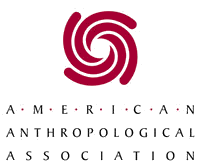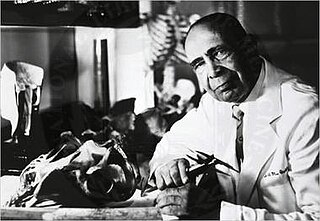Related Research Articles

Anthropology is the scientific study of humanity, concerned with human behavior, human biology, cultures, societies, and linguistics, in both the present and past, including past human species. Social anthropology studies patterns of behavior, while cultural anthropology studies cultural meaning, including norms and values. A portmanteau term sociocultural anthropology is commonly used today. Linguistic anthropology studies how language influences social life. Biological or physical anthropology studies the biological development of humans.

The American Anthropological Association (AAA) is an organization of scholars and practitioners in the field of anthropology. With 10,000 members, the association, based in Arlington, Virginia, includes archaeologists, cultural anthropologists, biological anthropologists, linguistic anthropologists, linguists, medical anthropologists and applied anthropologists in universities and colleges, research institutions, government agencies, museums, corporations and non-profits throughout the world. The AAA publishes more than 20 peer-reviewed scholarly journals, available in print and online through AnthroSource. The AAA was founded in 1902.

The American Association for the Advancement of Science (AAAS) is an American international non-profit organization with the stated goals of promoting cooperation among scientists, defending scientific freedom, encouraging scientific responsibility, and supporting scientific education and science outreach for the betterment of all humanity. AAAS was the first permanent organization to promote science and engineering nationally and to represent the interests of American researchers from across all scientific fields. It is the world's largest general scientific society, with over 120,000 members, and is the publisher of the well-known scientific journal Science.

Darkness in El Dorado: How Scientists and Journalists Devastated the Amazon is a polemical book written by author Patrick Tierney in 2000, in which the author accuses geneticist James Neel and anthropologist Napoleon Chagnon of conducting human research without regard for their subjects' well-being while conducting long-term ethnographic field work among the indigenous Yanomamo, in the Amazon basin between Venezuela and Brazil. He also wrote that the researchers had exacerbated a measles epidemic among the Native Americans, and that Jacques Lizot and Kenneth Good committed acts of sexual impropriety with Yanomamo.
Arthur Michael Kleinman is an American psychiatrist, social anthropologist and a professor of medical anthropology, psychiatry and global health and social medicine at Harvard University.

Edward Donnall "Don" Thomas was an American physician, professor emeritus at the University of Washington, and director emeritus of the clinical research division at the Fred Hutchinson Cancer Research Center. In 1990 he shared the Nobel Prize in Physiology or Medicine with Joseph E. Murray for the development of cell and organ transplantation. Thomas and his wife and research partner Dottie Thomas developed bone marrow transplantation as a treatment for leukemia.

Paul Edward Farmer was an American medical anthropologist and physician. Farmer held an MD and PhD from Harvard University, where he was a University Professor and the chair of the Department of Global Health and Social Medicine at Harvard Medical School. He was the co-founder and chief strategist of Partners In Health (PIH), an international non-profit organization that since 1987 has provided direct health care services and undertaken research and advocacy activities on behalf of those who are sick and living in poverty. He was professor of medicine and chief of the Division of Global Health Equity at Brigham and Women’s Hospital.
The Society for Applied Anthropology (SfAA) is a worldwide organization for the Applied Social Sciences, established "to promote the integration of anthropological perspectives and methods in solving human problems throughout the world; to advocate for fair and just public policy based upon sound research; to promote public recognition of anthropology as a profession; and to support the continuing professionalization of the field." Members include academic as well as practicing and applied anthropologists. The Society is unique among professional associations in membership and purpose – and in representing the interests of professionals in a wide range of settings including academia, business, law, public health, medicine, environment, and government. The unifying factor is a commitment to making an impact on the quality of life in the world. The Society publishes two journals: Human Organization and Practicing Anthropology. The SfAA was founded in 1941 and has maintained its status as an important resource for practicing and academic anthropologists alike.
The Society for Anthropological Sciences (SASci) is a scholarly association formed in 2004 to promote the development of empirical theory and methods in anthropology.
The American Association of Biological Anthropologists (AABA) is an international group based in the United States which affirms itself as a professional society of biological anthropologists. The organization publishes the American Journal of Biological Anthropology, a peer-reviewed science journal. It was formerly the American Association of Physical Anthropologists (AAPA), but changed its name after a series of votes between 2018 and 2020.

Carola Blitzman Eisenberg was an Argentine-American psychiatrist who became the first woman to hold the position of Dean of Students at Massachusetts Institute of Technology. From 1978 to 1990, she was the Dean of Student Affairs at Harvard Medical School (HMS). She has for a long time been Lecturer in the newly renamed Department of Global Health and Social Medicine at HMS. She was also both a Founding Member of Physicians for Human Rights and an Honorary Psychiatrist with the Massachusetts General Hospital in Boston, a longstanding position there.
Louise Lamphere is an American anthropologist who has been distinguished professor of anthropology at the University of New Mexico since 2001. She was a faculty member at UNM from 1976–1979 and again from 1986–2009, when she became a professor emerita.

William Montague Cobb (1904–1990) was an American board-certified physician and a physical anthropologist. As the first African-American Ph.D in anthropology, and the only one until after the Korean War, his main focus in the anthropological discipline was studying the idea of race and its negative impact on communities of color. He was also the first African-American President of the National Association for the Advancement of Colored People. His career both as a physician and a professor at Howard University was dedicated to the advancement of African-American researchers and he was heavily involved in civil rights activism. Cobb wrote prolifically and contributed both popular and scholarly articles during the course of his career. His work has been noted as a significant contribution to the development of the sub-discipline of biocultural anthropology during the first half of the 20th century. Cobb was also an accomplished educator and taught over 5000 students in the social and health sciences during his lifetime.
Edward Holland Spicer (1906-1983) was an American anthropologist who combined the four-field approach outlined by Franz Boas and trained in the structural-function approach of Radcliffe-Brown and the University of Chicago. He joined the anthropology faculty at the University of Arizona in 1946 and retired from teaching in 1976. Spicer contributed to all four fields of anthropology through his study of the American Indians, the Southwest, and the clash of cultures defined in his award-winning book, Cycles of Conquest. Spicer combined the elements of historical, structural, and functional analysis to address the question of socio-cultural change. He was a teacher, researcher, editor, and practitioner, who applied his perspective to address the issues confronting the people he worked with.
Beatrice Medicine was a scholar, anthropologist, and educator known for her work in the fields of Indigenous languages, cultures, and history. Medicine spent much of her life researching, teaching, and serving Native communities, primarily in the fields of bilingual education, addiction and recovery, mental health, tribal identity, and women's, children's, and LGBT community issues.
Monica Heller is a Canadian linguistic anthropologist and Professor at the University of Toronto. She was the president of the American Anthropological Association (AAA) from 2013 to 2015.
Carolyn Sargent is a medical anthropologist.
Mary Margaret Clark (1925–2003) was an American medical anthropologist who is credited with founding the sub-discipline of medical anthropology.
The Association of Black Anthropologists (ABA) founded in 1975, is an American organization which brings together Black anthropologists with a view to highlighting the history of African Americans, especially in regard to exploitation, oppression and discrimination. It encourages in particular the involvement of Black students, including the recruitment of graduates, and establishes exchanges with African anthropologists. It publishes the journal Transforming Anthropology. The ABA seeks to address theories across academic disciplines which do not accurately represent the oppression of communities of color, further to aid and strengthen these theories with the inclusion of African American history. It is one of the sections of the American Anthropological Association.
William W. "Bill" Dressler is an American anthropologist known for his concept of cultural consonance and work on cultural models especially in the context of biocultural medical anthropology. He has done fieldwork in Mexico, Brazil, the West Indies, and the United States, and worked at the University of Alabama since 1978. He is now Professor Emeritus. In 2023, he was elected to the National Academy of Sciences.
References
- Francine, Saillant; Serge Genest (2006). Medical Anthropology. Malden, MA: Blackwell. pp. Chapter 2, "Medical Anthropology in the United States, " Arachu Castro (Harvard University) and Paul Farmer (Harvard University). ISBN 978-1-4051-5249-5.